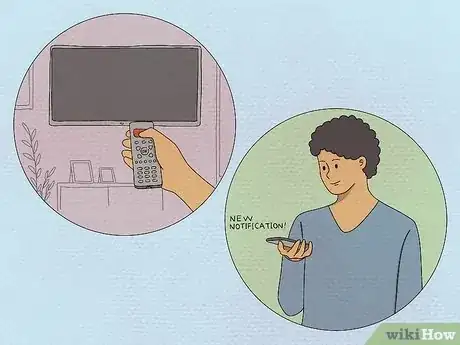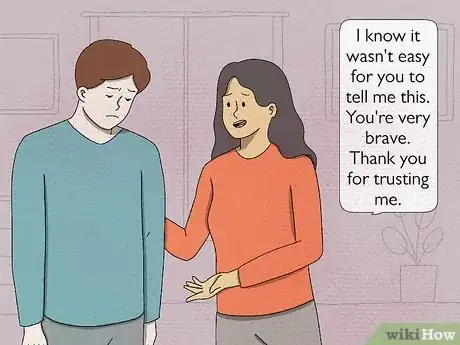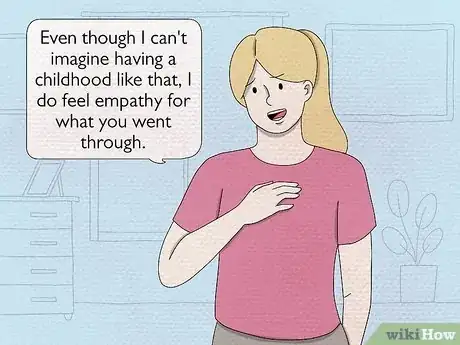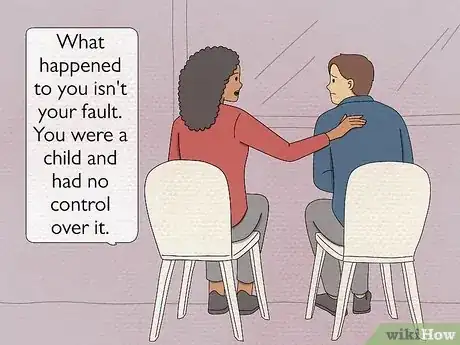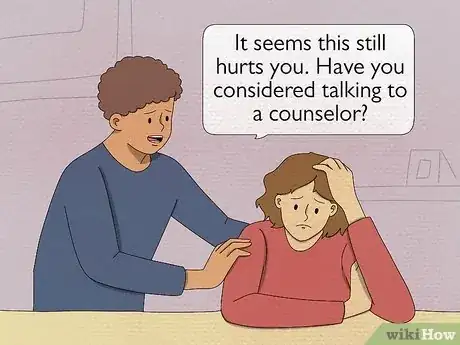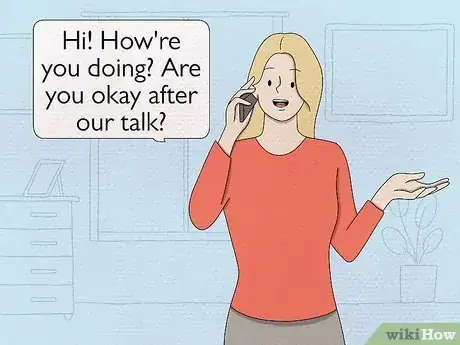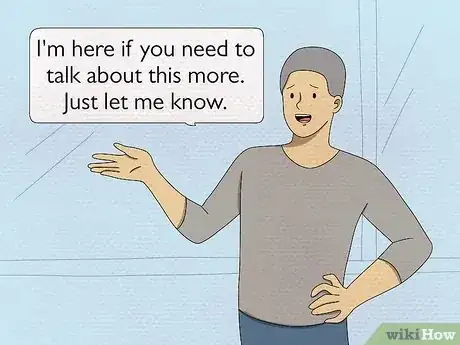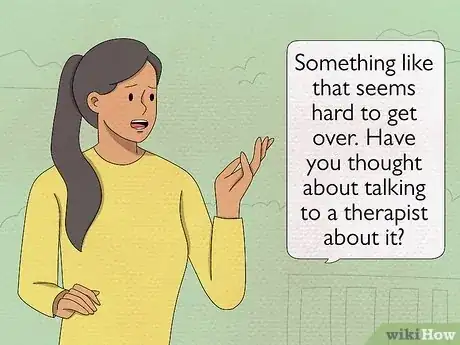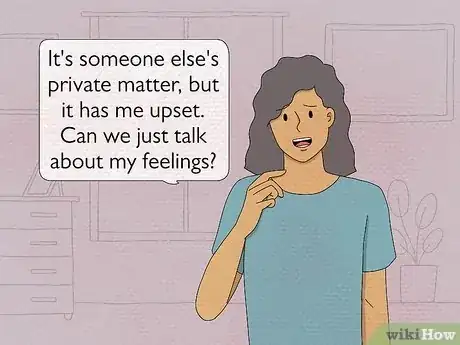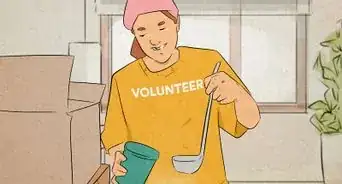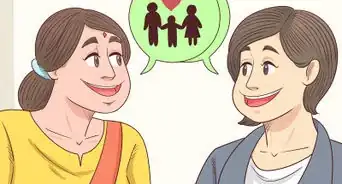This article was co-authored by Sabrina Grover, LMSW. Sabrina Grover, LMSW is a Licensed Master Social Worker (LMSW) who earned her degree in Advanced Clinical Practice from New York University. Sabrina has experience working in substance abuse recovery centers and schools where she gained experience providing evidence-based treatment to children, adolescents, adults, and families. Sabrina specializes in Dialectical, Narrative, and Cognitive Behavioral Therapies. She has particular expertise in treating clients struggling with grief, complex trauma, interpersonal difficulty, family conflict, anxiety, and depression. She commits to providing a supportive environment for everyone who commits to growth and offering a warm, non-judgmental atmosphere.
There are 9 references cited in this article, which can be found at the bottom of the page.
This article has been viewed 26,772 times.
When someone reveals to you that they had a difficult childhood, it means they really trust you enough to open up. We can help you respond in a way that shows you're listening and that you really care about what they're saying.
Steps
Listening Actively
-
1Limit distractions and interruptions. When someone is sharing something as personal as the details of a difficult childhood the last thing you want is a phone constantly ringing, beeping, and buzzing. And the last thing they want is to have to repeat a painful detail because you were distracted. Do what you can to remove any distractions and limit interruptions so the person feels comfortable talking with you.[1]
- If you know in advance they'll be telling you something personal, eliminate distractions and possible interruptions in advance. For example, you might turn the TV off and ask your kids to play in their room.
- Avoid checking your alerts and notifications while the person is talking. Give them your full attention.
- If you two are conversing over a meal, put your fork down, look at them, and focus on listening.
-
2Focus on what's being said. It may not be easy for the person to tell you about their childhood so don't start daydreaming or allow your thoughts to drift while they're talking. Focus your thoughts and senses on the person so that you will be able to respond appropriately and with empathy.[2]
- Active listening techniques may be helpful, such as asking for clarification, summarizing, and repeating back what they have said to you.
- Look at them while they are talking. This is a clear way to let them know you're paying attention.
- Notice if they seem to be having a difficult time telling you about their childhood. For example, are they hesitating a lot? Is their voice softer than usual or does it sound strained?
- Think about what they are telling you. Focus your mind on understanding their story.
Advertisement -
3Pay attention to body language. People don't always say so when something is bothering them. Sometimes the only clue is in their body language. Although they may sound calm when telling you about their childhood, there may be nonverbal signs that what they are telling you is hard for them to talk about.
- Does their body seem tense? For instance, is their jaw tense? Are their lips pressed tightly together?
- Do they seem nervous or anxious? For example, are they sweating or shaking? Are they pacing or do they seem fidgety?
- Do they seem to be having trouble breathing? Is their breath shallow or really fast?
- Do they seem to have trouble making eye contact with you?
-
4Take their perspective. Some of the things people may tell you about their childhood can be hard to understand or imagine. Rather than disbelieving, try to put yourself in their shoes and really consider what they went through and how it might have felt.[3]
- Visualize what they are telling you. This will help you take their perspective. For example, if they're telling you about living in foster care, picture moving into a new bedroom every few months.
- Imagine how you would have felt if you had their childhood. For instance, you might think about how confusing and isolating it might be to have a serious childhood disease.
-
5Stay calm. Depending on what is said and who it is saying it, you may be shocked, outraged, or saddened when someone tells you about their hard childhood. Instead of responding with a strong reaction, try to remain calm so that you can support the person telling you about their childhood.[4]
- Keep your breathing slow and steady. If you need to, silently remind yourself to inhale slowly, hold it for a second, and then release it slowly. Also, focus on your body and see if you are demonstrating any restlessness, tension, or other indicators of discomfort.
- Remind yourself that although what happened to them wasn't good, they're okay now and here with you.
Responding With Empathy
-
1Acknowledge that they shared. When you respond to someone describing a hard childhood you should try to show empathy.[5] It may be very difficult, embarrassing, or even scary for them to share something so personal. You can show empathy by letting them know that it took courage to share this with you and that you appreciate their trust.
- Depending on the relationship, a display of touch may be appropriate. Place a hand on their hand or arm briefly to display empathy.
- You might also try saying, “I know it wasn't easy for you to tell me this. You're very brave. Thank you for trusting me.”
- Or, you could try, “Thank you for sharing this with me. I know it was hard for you to talk about, but I'm glad you did.”
-
2Be honest. There is no need to try to make the person feel as though you completely understand or can relate to what they went through. In fact, it can be counterproductive to say this and make the person feel as though you don't understand the depths of their pain. If you can't imagine what it must have felt like to have their childhood, then say so. They will appreciate your honesty and know that they made the right decision in sharing this with you.
- You might say something like, “I can't begin to understand what that must have been like. I do know that you're really brave and strong for getting through it.”
- Or, you might say, “Even though I can't imagine having a childhood like that, I do feel empathy for what you went through.”
-
3Ask questions. You don't need to interrogate the person, but it is okay to ask questions to make sure you understand everything. Be sure not to ask leading questions, appearing as though you know how they feel or what they went through. Try to be sensitive and calm when you're asking for more information and respect their wishes if they don't want to answer your questions.
- For example, you might say, “Do you feel comfortable telling me more about what happened? I want to fully understand."
- If they say they don't feel comfortable answering a question, you might say, “It's okay. I understand that this is difficult for you. You tell me what you're comfortable with.”
-
4Tell them you believe them. This may be one of the most important things you do when you're responding to someone describing a hard childhood.[6] It can take a lot of courage for them to tell you, especially if they've never told anyone else. Letting them know that you believe them can help reassure and calm them.
- You might say something like, “I know this wasn't easy for you to talk about. I believe what you've told me and thank you for trusting me.”
- Or, you might simply say, “I believe you.”
-
5Remind them it's not their fault. Depending on what happened during their childhood, the person may feel that they are to blame. One way that you can respond is to let them know that this isn't the case.[7] Let the person know that things that happened in their childhood were beyond their control and weren't their fault.
- For example, you might say, “What happened to you isn't your fault. You were a child and had no control over it.”
- Or, for instance, you could try saying, “You aren't to blame for what happened. You are brave, though, for talking about it now.”
-
6Avoid trying to be a counselor. Although you may want to support someone that has described their hard childhood, remember that you're not a trauma or crisis professional.[8] Instead of trying to tell the person how to heal and move on or find out how their childhood made them feel, focus on letting them know that you're there to support them.[9]
- You don't have to help them 'process' what happened. For instance, don't try to get them to remember 'repressed' memories.
- Encourage them to seek professional help if you feel their childhood might still be affecting them. You might say, “It seems this still hurts you. Have you considered talking to a counselor?”
Supporting Them Over Time
-
1Check-in with them. You don't have to spend 24 hours a day monitoring them, but a good way to support them is to check on them every now and then.[10] Just asking how they're doing can go a long way in supporting them as they cope with having a hard childhood.
- If they seem to be having a difficult time coping with what they told you, you might check on them every day or couple of days. You might call and say, “Hi! How're you doing? Are you okay after our talk?”
- Stop by and see them when you can. Sometimes people can sound fine, but seeing them can give you the full story.
-
2Offer support.[11] There are several ways that you can do this that don't require a lot of effort of time, but may have a positive impact on the person. Being there for them lets them know that someone cares and that they're not alone in what they're going through.[12]
- A powerful way to do this is often in writing. Send them a card with a heartfelt message. This effort lets them know that your support is genuine and not just something you said.
- You might offer to just be with them. You don't have to do or say anything, sometimes a person's presence is enough.
- Offer to listen if they want to talk more. For example, you might say, “I'm here if you need to talk about this more. Just let me know.”
-
3Suggest professional help. In some cases, a hard childhood can lead a person to have other challenges such as substance abuse or post-traumatic stress disorder.[13] They may need professional support to work through what happened to them. Gently suggest that they talk to a therapist or counselor.[14]
- For example, you might say, “Something like that seems hard to get over. Have you thought about talking to a therapist about it?”
- Or, for instance, you could tell them, “I think your childhood might still be affecting you. Would you consider seeing a counselor to work through it?”
- If you have seen a counselor yourself, then you can say, "I talked to someone about what happened to me and it was incredibly helpful." Making it about you and not them helps with stigmatization.
- You could refer them to a hotline such as 1-800-656-4673 or suggest that they text crisis counselors by texting 'GO' to 741741.
Managing Your Own Emotions
-
1Recognize how you feel. It can be upsetting if the person tells you that someone you know is responsible for their hard childhood. It can also be distressing if you care a lot about the person and the events were extremely traumatic. You may need to work through your feelings about what they have told you.[15] Think about if your feelings are an appropriate emotional reaction to what this person disclosed, or if you are experiencing codependency and this person's emotions are controlling you.
- For example, if your cousin tells you that a relative abused them it might be emotionally challenging for you to handle.
- Or, for instance, if your spouse was a young runaway it might be hard for you to accept.
- Think about what they told and write down all the emotions that you feel as you're thinking about it. For example, you might write, “frightened, sad, disappointed, confused.”
-
2Do something calming. It can be challenging for you as well as the person when someone is describing a difficult childhood. You might find that you feel sad, angry, or confused. You may need to do something to relax yourself and calm down.[16]
- You might go for a walk after you get through talking to the person. Even a brief walk can help clear your mind and calm you down.
- Try meditating for a while. Sit or lie somewhere comfortable. Close your eyes and try to focus on your breathing.
-
3Depend on your support system. In some situations you may need to seek support yourself because of something someone told you about their childhood.[17] Turn to your close family and friends and let them know that you need help working through something.
- If you don't feel comfortable telling them what has you upset, you might say something like, “I don't want to go into details, but I'm upset and just need someone to be with me.”
- Or, if you're trying to respect the privacy of the person that confided in you, you could say, “It's someone else's private matter, but it has me upset. Can we just talk about my feelings?”
- Spend some time doing something relaxing, calming, or even fun to help you release your stress and tension.
Expert Q&A
-
QuestionWhat to say to a friend who needs support?
 Sabrina Grover, LMSWSabrina Grover, LMSW is a Licensed Master Social Worker (LMSW) who earned her degree in Advanced Clinical Practice from New York University. Sabrina has experience working in substance abuse recovery centers and schools where she gained experience providing evidence-based treatment to children, adolescents, adults, and families. Sabrina specializes in Dialectical, Narrative, and Cognitive Behavioral Therapies. She has particular expertise in treating clients struggling with grief, complex trauma, interpersonal difficulty, family conflict, anxiety, and depression. She commits to providing a supportive environment for everyone who commits to growth and offering a warm, non-judgmental atmosphere.
Sabrina Grover, LMSWSabrina Grover, LMSW is a Licensed Master Social Worker (LMSW) who earned her degree in Advanced Clinical Practice from New York University. Sabrina has experience working in substance abuse recovery centers and schools where she gained experience providing evidence-based treatment to children, adolescents, adults, and families. Sabrina specializes in Dialectical, Narrative, and Cognitive Behavioral Therapies. She has particular expertise in treating clients struggling with grief, complex trauma, interpersonal difficulty, family conflict, anxiety, and depression. She commits to providing a supportive environment for everyone who commits to growth and offering a warm, non-judgmental atmosphere.
Licensed Master Social Worker Validation is key! Validate what they're saying, empathize with what they're sharing, and remind them that you're there to support them.
Validation is key! Validate what they're saying, empathize with what they're sharing, and remind them that you're there to support them.
Warnings
- If a child tells you about abuse that happened to them, even if it was when they were much younger, you should report it to the proper authorities.⧼thumbs_response⧽
References
- ↑ http://www.forbes.com/sites/womensmedia/2012/11/09/10-steps-to-effective-listening/#193ba1ea26fb
- ↑ http://www.state.gov/m/a/os/65759.htm
- ↑ http://www.forbes.com/sites/womensmedia/2012/11/09/10-steps-to-effective-listening/#193ba1ea26fb
- ↑ https://www.childwelfare.gov/pubPDFs/educator.pdf
- ↑ https://aifs.gov.au/cfca/publications/responding-children-and-young-people-s-disclosures-abu
- ↑ https://www.rainn.org/articles/how-respond-survivor
- ↑ https://www.childwelfare.gov/pubPDFs/educator.pdf
- ↑ https://aifs.gov.au/cfca/publications/responding-children-and-young-people-s-disclosures-abu
- ↑ Sabrina Grover, LMSW. Licensed Master Social Worker. Expert Interview. 3 December 2021.
- ↑ https://www.rainn.org/articles/how-respond-survivor
- ↑ Sabrina Grover, LMSW. Licensed Master Social Worker. Expert Interview. 3 December 2021.
- ↑ http://www.helpguide.org/articles/ptsd-trauma/emotional-and-psychological-trauma.htm#helping
- ↑ https://www.psychologytoday.com/blog/where-science-meets-the-steps/201505/8-reasons-its-so-hard-overcome-tough-childhood
- ↑ Sabrina Grover, LMSW. Licensed Master Social Worker. Expert Interview. 3 December 2021.
- ↑ https://aifs.gov.au/cfca/publications/responding-children-and-young-people-s-disclosures-abu
- ↑ https://www.rainn.org/articles/self-care-friends-and-family
- ↑ https://www.rainn.org/articles/self-care-friends-and-family
